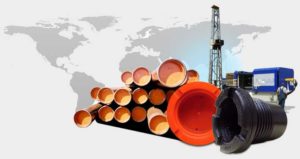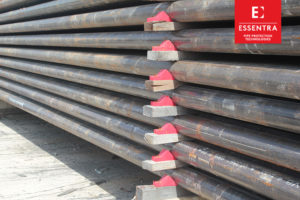Pipe problems in oil rigs and water wells can lead to oil or water damage, costly repairs, as well as water and oil leakage. Learning about pipe problems can help home and business owners take precautionary measures to prevent costly damages.
Understanding Pipe Problems
Understanding the causes and solutions for pipe problems can enhance the longevity and efficiency of both oil and water infrastructure, ensuring smoother operations and reducing the risk of unexpected failures. Proper maintenance and the use of advanced pipe protection technologies are crucial in safeguarding these valuable assets.
Noisy Pipes
Many water well and oil rig pipes rattle and squeal on a regular basis. The rattling, pounding, or shaking noises, also known as water hammer, are produced when water flow is suddenly halted by closing a faucet or any other plumbing closure. Repairing water hammers involves the installation of water hammer arresters and steel pipe thread protectors onto a water-supply system.
Frozen Pipes
Pipes in water wells and oil rigs located in four-season climates must be protected from freezing. Freezing water in well pipes can cause the pipes to break or burst. Installing steel pipe thread protectors can help protect pipes from freezing.
Temperature Problems
Some pipes have poor temperature resistance, and will eventually break down and spring leaks if subjected to heat and cold for prolonged periods. Other types of pipes, such as Polybutylene, have poor resistance to temperatures, light, and chemicals. This type of plastic material was much vaunted in the 1970s as the pipe of the future. However, many contractors stopped using it in water wells and oil rigs when it started showing widespread degradation.
Grounding Corrosion
Corrosion is a common pipe problem especially for copper pipes. The most common problem with copper pipes occur when the connection between the copper pipe and the grounding clamps corrode the copper pipe. This usually happens when the grounding clamp is made from iron or steel. Copper pipe corrosion can cause a leak that can go undetected underground for months.
Freezing
Pipes carrying well water can freeze in the winter if they are not buried deep enough. The depth for burying copper is determined by the frost depth in your region or country. Avoid using copper pipes in oil rigs and water wells because it conducts heat and cold. Heat and cold in the soil can be transferred to underground pipe systems causing the pipes to burst. Prevent this by burying your copper water pipes deep enough to prevent freezing.
Joints
Using sections of rigid pipes underground on water wells and oil rigs can increase the chances of leaks because each part has to be jointed. Joints in water well and oil rig pipes are weak spots where leaks can spring. Consider installing long stretches of soft copper wire instead of short ones in water well and oil rig pipe systems.
Solder
Soldering copper pipes can leach lead into the water supply. Lead is a toxic substance that is harmful to health if consumed. It is impossible to determine if lead was used for underground pipe solders without digging up the line. Test your water for lead and consider replacing your underground copper water line with new pipe soldered with silver instead. Another alternative is to let the water run for a few minutes before using it. This flushes out lead that leached into the water.
Avoiding Pipe Problems
Different elements such as temperature changes, corrosion, soldering, and the like can be avoided using different strategies. Contact MSI as they can help you avoid these costly issues.




